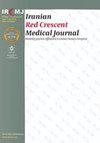Knowledge and Attitude of Cancer Patients’ Companions towards Chemotherapy and Radiotherapy-induced Oral Complications and Dental Considerations
IF 0.2
4区 医学
Q3 MEDICINE, GENERAL & INTERNAL
引用次数: 0
Abstract
Background: Although Knowledge of the side effects of cancer treatments is crucial for everyone, it is more vital for patients' companions. Since they can significantly improve patients' attitudes towards cancer treatments and help them tolerate the disease; Objectives: In this study, we aimed to examine the level of knowledge and attitudes of companions about dental considerations and oral complications related to chemotherapy and radiotherapy. Methods: In this cross-sectional study, a questionnaire was provided to companions at Kowsar Hospital in Semnan University, Iran, in October 2021. A total of 176 companions were selected by simple sampling method. Inclusion criterion consisted of the companions who were most of the time alongside the patients. The researcher-designed questionnaire included three sections: demographic variables, knowledge of and attitude toward dental considerations, and oral complications related to chemotherapy and radiotherapy (15 and 4 items, respectively). The relationship between knowledge and attitude with variables (e.g., gender, education level, duration of the treatment, and the location of the cancer) was investigated. Results: Overall, 176 companions participated in this research. A total of 152 (86.4%) individuals had low to moderate knowledge (score 7-14), and only 6 (3.4%) companions had high knowledge (score 15-19). Around 74 (42%) individuals had moderate attitude scores, and 98 (55.7%) had high attitude scores. Companions’ knowledge scores increased significantly with higher education and having head and neck cancer patients. Moreover, companions’ attitude scores decreased significantly with the age and duration of patients’ treatments and increased significantly with higher education and having gastrointestinal cancer patients. Conclusion: The level of knowledge and attitude of companions was low to moderate about chemotherapy- and radiotherapy-induced oral complications and dental considerations. Therefore, improving the comprehensive education of this group is required.癌症患者同伴对化疗和放疗引起的口腔并发症的认识、态度及牙科注意事项
背景:尽管了解癌症治疗的副作用对每个人来说都至关重要,但对患者的同伴来说更为重要。由于它们可以显著改善患者对癌症治疗的态度,并帮助他们耐受疾病;目的:在本研究中,我们旨在检查同伴对化疗和放疗相关的牙科考虑和口腔并发症的知识和态度水平。方法:在这项横断面研究中,于2021年10月向伊朗塞姆南大学Kowsar医院的同伴提供了一份问卷。采用简单抽样方法共选择176名同伴。纳入标准包括大部分时间与患者在一起的同伴。研究人员设计的问卷包括三个部分:人口统计学变量、对牙科考虑的知识和态度,以及与化疗和放疗相关的口腔并发症(分别为15项和4项)。研究了知识和态度与变量(如性别、教育水平、治疗时间和癌症的位置)之间的关系。结果:共有176名同伴参与了这项研究。共有152名(86.4%)个体具有低至中等知识(得分7-14),只有6名(3.4%)同伴具有高知识(得分15-19)。大约74人(42%)的态度得分中等,98人(55.7%)的态度评分较高。同伴的知识得分随着教育程度的提高和癌症患者的增多而显著增加。此外,同伴的态度得分随着患者年龄和治疗时间的延长而显著下降,随着教育程度的提高和患有癌症的胃肠道患者而显著增加。结论:同伴对化疗和放疗引起的口腔并发症和牙科注意事项的知识和态度水平为低至中等。因此,需要改进这一群体的综合教育。
本文章由计算机程序翻译,如有差异,请以英文原文为准。
求助全文
约1分钟内获得全文
求助全文
来源期刊

Iranian Red Crescent Medical Journal
MEDICINE, GENERAL & INTERNAL-
CiteScore
1.16
自引率
0.00%
发文量
0
期刊介绍:
The IRANIAN RED CRESCENT MEDICAL JOURNAL is an international, English language, peer-reviewed journal dealing with general Medicine and Surgery, Disaster Medicine and Health Policy. It is an official Journal of the Iranian Hospital Dubai and is published monthly. The Iranian Red Crescent Medical Journal aims at publishing the high quality materials, both clinical and scientific, on all aspects of Medicine and Surgery
 求助内容:
求助内容: 应助结果提醒方式:
应助结果提醒方式:


